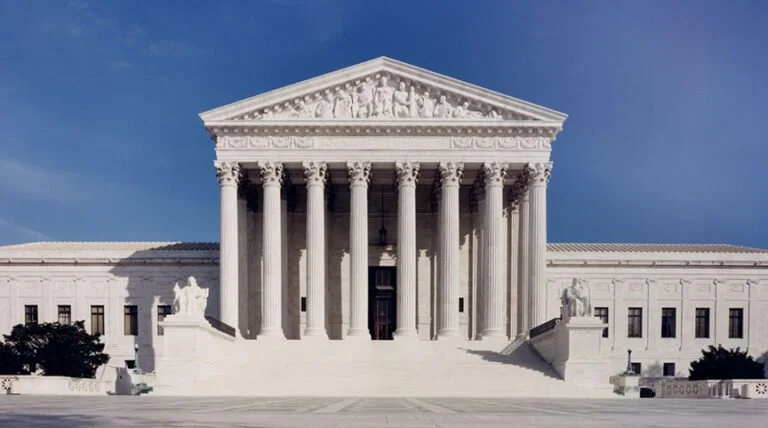Friends of the River Litigation in Defense of the Clean Water Act Going to the U.S. Supreme Court?
U.S. Supreme Court building. Photo courtesy of the Supreme Court of the United States.
Friends of the River and its four coalition partners have been in a long-running legal struggle with the licensees of several federally licensed hydropower projects. These licensees have taken to California’s state courts to reduce state authority to protect and manage their waters. These state cases will have an impact on the nation.
One case arose in state courts when the appeals court sua sponte* decided that California Environmental Quality Act (CEQA) was preempted by the Federal Power Act, mistakenly relying on the 1944 First Iowa decision. That contention was rejected by the California Supreme Court two times, the last time was summer/autumn of 2022.
The cases going to the U.S. Supreme Court arose in two federal appellate courts. These are the first courts of jurisdiction when challenging decisions by the Federal Energy Regulatory Commission (FERC). The appeals courts’ decisions are binding within their circuits. The ninth circuit includes many western states and the DC circuit is the home of FERC’s headquarters. Thus the appeals courts’ actions (along with two other east coast circuits) already have national precedence. The U.S. Supreme Court can therefore affirm these binding precedents, overturn them, or simply refuse to take up the cases.
This previously-undisputed authority under the Federal Clean Water Act Section 401 empowers states to provide oversight to hydropower and other projects to protect water quality in the state. Timing is especially critical since the states sometimes have only one opportunity per generation to prescribe requirements (a “water quality certification”) during renewal of a federal hydropower license. For some facilities, this means upcoming relicensing will be the first time major environmental laws are applied.
“The dam owners attempted to subvert environmental obligations by taking advantage of a couple of lawsuits that threatened the state’s authority.”
We’ve lamented over the widespread success of the dam owners in escaping state water quality jurisdiction in previous publications of the River Advocate under the accurate, but tongue-in-cheek moniker “the 401 apocalypse.” Yes, the states losing their once-in-a-generation-or-two role in the decisions about non-federally owned dams would be bad for rivers, very bad.
The dam owners attempted to subvert environmental obligations by taking advantage of a couple of lawsuits that threatened the state’s authority. A counter-litigation strategy was needed. So, we took the combined Yuba, Bear, and Merced River case to the 9th Circuit federal court of appeals and played defense in the DC circuit court on the Tuolumne case, winning both cases last year (plus another case in the California Supreme Court). That was nice. But whether the game is over for the Nevada, Merced, Modesto, and Turlock Irrigation Districts and the Yuba Water Agency will depend on the decision by the U.S. Supreme Court on whether to take up their appeals.
Our attorneys (the Water & Power Law Group, the Western Environment Law Center, and the Morrison Foerster law firm) are sharpening their U.S. Supreme Court practice skills and alliances in preparation to respond.
Needless to say, our litigation budgets grow tighter as more legal work is done. Our work, here, has national consequences, and yes, donations to help fund the effort are tax deductible.
Resources
*Sua sponte means that the court did this voluntarily without provocation from either the prosecution or defense.
Court Victory for Clean Water and State Regulators in California. A press release that covers our coalition’s victory in court.

